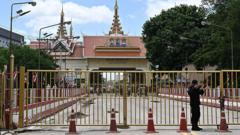Paul Chambers’ arrest highlights ongoing issues regarding freedom of expression in Thailand and the implications for foreign nationals.
American Scholar Detained in Thailand for Criticizing Monarchy

American Scholar Detained in Thailand for Criticizing Monarchy
The U.S. State Department expresses concerns over the arrest of Paul Chambers under Thailand's lèse-majesté laws.
The recent arrest of an American academic in Thailand has raised eyebrows among U.S. officials, sparking serious concerns from the State Department. Paul Chambers, an expert in civil-military relations at Naresuan University, has been charged under the nation's strict lèse-majesté laws that criminalize any defamation or insult directed towards the monarchy.
U.S. officials confirmed that Chambers was apprehended on allegations linked to his criticism of Thailand's royal family and additionally under the Computer Crimes Act. Tammy Bruce, a spokeswoman for the State Department, conveyed that they are actively liaising with Thai authorities regarding his situation.
Thailand's lèse-majesté laws are notoriously severe, prohibiting insults against the king and royal family members. Violations of these laws can lead to significant prison sentences, with possible terms ranging from three to fifteen years. Human rights organizations have condemned these restrictions, seeing them as impediments to free speech.
Chambers’ arrest is particularly noteworthy as it marks a rare instance of a foreign citizen being taken into custody for such offenses. The State Department has reiterated their concerns over the enforcement of these laws, advocating for the protection of freedom of expression within Thailand.
In response to the situation, consular officials from the U.S. Embassy in Bangkok have sought access to Chambers, reaffirming their commitment to ensuring he receives fair treatment in light of the charges against him. As a key ally to Thailand, the U.S. will continue to monitor developments closely.
U.S. officials confirmed that Chambers was apprehended on allegations linked to his criticism of Thailand's royal family and additionally under the Computer Crimes Act. Tammy Bruce, a spokeswoman for the State Department, conveyed that they are actively liaising with Thai authorities regarding his situation.
Thailand's lèse-majesté laws are notoriously severe, prohibiting insults against the king and royal family members. Violations of these laws can lead to significant prison sentences, with possible terms ranging from three to fifteen years. Human rights organizations have condemned these restrictions, seeing them as impediments to free speech.
Chambers’ arrest is particularly noteworthy as it marks a rare instance of a foreign citizen being taken into custody for such offenses. The State Department has reiterated their concerns over the enforcement of these laws, advocating for the protection of freedom of expression within Thailand.
In response to the situation, consular officials from the U.S. Embassy in Bangkok have sought access to Chambers, reaffirming their commitment to ensuring he receives fair treatment in light of the charges against him. As a key ally to Thailand, the U.S. will continue to monitor developments closely.





















